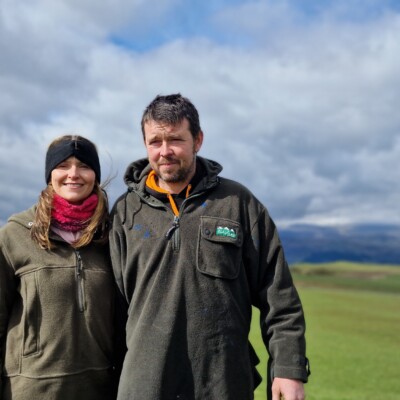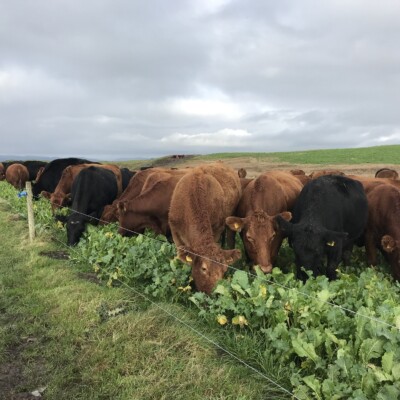A North Wales cattle breeding farming couple have highlighted how data driven decision making is helping them make efficiencies and is improving their sustainable farming practices by managing their carbon footprint and improving biodiversity across their land.
Located on the outskirts of Llanrwst is Moelogan Fawr, an upland beef and sheep farm, covering an area of 751 acres. The farm is home to the Jones family, where husband and wife team, Llion and Sian, as well as their three children Gwern, Beca and Annie, look after 150 Stabiliser cattle and about 850 improved Welsh ewes. The farm has been in Sian’s family since 1972 and they are the third generation to farm here.

“Before taking over the farm in 2018, we were farming on a small National Trust farm, a 40-acre holding. Llion worked on a dairy farm and I worked at the local authority as a surveyor as well. Starting here was a massive step for us, making farming our full-time job but this is such an excellent opportunity for us and also our children,” said Sian.
Since taking over the farm six years ago, the family have been busy nurturing the land and improving biodiversity on the farm. In 2018, the Jones’ planted 24 acres of woodland on the farm, through a Glastir Woodland Creation grant, that has resulted in increasing the habitat on farm and in doing so increases its resilience to environmental changes now and in the future. The woodland also improves the connectivity of habitat across the lower parts of Moelogan Fawr, bolstering biodiversity on the farm.
Sian and Llion are keen to be as sustainable and efficient as possible and regularly record and measure their farm data, including carbon auditing, which allows them to take away tangible advice on how to lower their carbon footprint.
“The information from the carbon audit and the biodiversity survey…has really inspired our decision making. For example, at the beginning we were just growing rye grass and then we started looking into the inclusion of herbal leys, and understanding what worked where. On the lower ground we have herbal leys and they do really well there. It’s learning what works on which ground and how to best look after it. We don’t graze it too hard until it’s properly established and that helps too. These are just a few examples of how we are moving towards a healthier farm, healthier soils and a more efficient business,” adds Sian.
As part of their efforts to be more efficient, a rotational grazing system has also been implemented, and new infrastructure through tracks across the farm, are providing tangible results.
“We try to extend our grazing season and rear everything off grass. The cattle used to come in around September but now we have been able to extend their outdoor season until October / November. That’s reduced winter housing and feeding by two months and we hope to extend this further. The cows are 100% rotational grazed during the grazing season and we’ve started implementing that for the ewes as well,” said Llion.
“It’s great to see how the rotational grazing system has helped us be more efficient and improve soil health as well. Through the dry summers this has really helped. Data recording has helped us see where the efficiencies need to be made and that level of data driven decision making is something that we will continue to do,” added Sian.
Talking about their sustainability goals, Sian and Llion are clear that it can’t be business as usual.
“Sustainability in our eyes goes hand in hand with efficiency. The more efficient we can be the better – it will improve our carbon footprint, and help us to achieve our goals. We are working towards reducing bought in inputs, getting our livestock as healthy as possible, utilising the grass, and protecting the soil”, explains Sian.
Dr. Heather McCalman, Hybu Cig Cymru – Meat Promotion Wales (HCC)’s Research and Development and Sustainability Executive, who has been working with Sian and Llion on various projects said:
“Farms like Moelogan Fawr are setting the scene for future farming practices. It is essential that farms embrace research and development and combine traditional farming practices with the benefits of technology and data to be sustainable and fit for the future.
“While the impact of agriculture on climate change continues to be a hot topic, it’s important to remember that there are huge variations in the environmental impact of different farming systems across the world, with Wales being especially suited for rearing cattle and sheep, as we can see here.
“The Welsh way of farming has a very different story to tell compared with some of the intensive and industrial systems found in other parts of the world. With high standards of animal husbandry and pasture land management, the Jones family help to preserve our unique landscape. They are making a positive contribution to mitigating climate change and are managing their grassland by combining traditional practices with innovation.”
To read more about the Welsh Way of farming, click here.
